Have you ever found yourself repeatedly typing “I hope everything is going well” in your emails or messages? While this phrase is perfectly fine, it can become monotonous and lose its sincerity when overused. As someone who communicates frequently with colleagues, clients, and friends, I’ve realized the importance of diversifying our well-wishing expressions.
This blog post will explore alternative ways to convey your good wishes and genuine interest in others’ well-being. We’ll look into various phrases and expressions that can help you maintain a personal touch in your communications while avoiding repetition. Whether you’re writing a formal email or sending a quick text to a friend, these alternatives will help you express your concern and support more effectively.
1. Wishing you all the best (Formal).
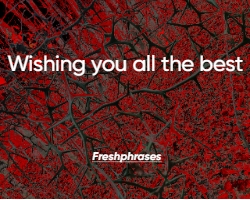
You can use it in professional settings or when you want to convey sincere good wishes. It’s a great way to show you care without being too personal.
“Wishing you all the best” is a formal and traditional way to express hope for someone’s success or happiness.
It is versatile and suitable for various contexts, from personal emails to professional letters. This expression conveys a heartfelt desire for all things positive in the recipient’s life.
Usage examples:
- As you embark on your new job, I wish you all the best in your future endeavors.
- During your recovery, I’m wishing you all the best and hoping for your speedy recovery.
2. Hope you’re keeping well.
When you want to show genuine care, using “Hope you’re keeping well” is a great way. I hope everything is going well and that you’re staying healthy. This phrase conveys your concern for their overall well-being, making it a warm and personal greeting.
Usage examples:
- Hope you’re keeping well during these busy times.
- Hope you’re keeping well and enjoying the season.
3. I trust all is well with you (Professional).
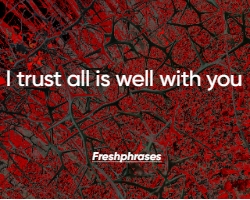
“I trust all is well with you” is used in more formal or professional contexts. It conveys a sense of polite interest in the other person’s well-being without being too personal.
It’s ideal for use in emails or communications where a respectful tone is necessary.
Usage examples:
- I trust all is well with you. Could we discuss the upcoming conference details?
- In preparation for our meeting next week, I trust all is well with you.
4. Hope you’re doing fine.
“Hope you’re doing fine” is a straightforward, friendly way to reach out. It’s perfect for casual conversations when I hope everything is going well for them. This phrase is versatile and can be used in both personal and professional settings.
Usage examples:
- Hope you’re doing fine with the new project.
- Hope you’re doing fine and enjoying your day.
5. Hope you’re having a fantastic day (Friendly).
This expression is a cheerful and friendly way to wish someone a great day. It’s ideal for casual communication and works well in both spoken and written formats, like text messages or casual emails.
Usage examples:
- Just wanted to say hi and hope you’re having a fantastic day!
- Stopped by your profile and saw your recent achievements, hope you’re having a fantastic day with all the good news!
6. Hope you’re having a good time.
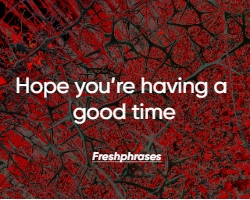
To wish someone well in a specific context, use “Hope you’re having a good time”. I hope everything is going well and that you’re enjoying yourself. This phrase is great for social settings or when someone is attending an event.
Usage examples:
- Hope you’re having a good time at the conference.
- Hope you’re having a good time on your vacation.
7. Trusting everything is favorable on your end (Formal).
“Trusting everything is favorable on your end” is a formal expression used to inquire or express hope about someone’s circumstances in a dignified manner.
It is particularly suitable for business correspondences where maintaining a professional tone is essential.
Usage examples:
- As we proceed with the project, we trust everything will be favorable on your end.
- In light of recent changes, trusting everything is favorable on your end.
8. How’s life treating you lately.
If you want to start a deeper conversation, “How’s life treating you lately” is an inviting question. I hope everything is going well in your life. This phrase opens the door for them to share more about their current experiences.
Usage examples:
- How’s life treating you lately? Any new updates?
- How’s life treating you lately? Let’s catch up soon.
9. Hope this message finds you well.
A classic opener for emails, “Hope this message finds you well” is professional and courteous. I hope everything is going well and that you’re in good health. It’s a great way to start a communication on a positive note.
Usage examples:
- Hope this message finds you well and in good spirits.
- Hope this message finds you well and thriving.
10. Trust everything’s going smoothly.
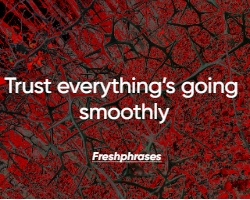
When you want to express confidence in their situation, “Trust everything’s going smoothly” is ideal. I hope everything is going well and that there are no major hiccups. This phrase is reassuring and supportive.
Usage examples:
- Trust everything’s going smoothly with the project.
- Trust everything’s going smoothly and you’re staying positive.
11. Hoping things are going great for you (Casual).
This phrase is a casual and friendly way to express your hope that someone’s life or current situation is proceeding well.
It’s less formal and can be used in texts or conversations with friends or colleagues, making it a great choice for less formal communications.
Usage examples:
- Just checking in and hoping things are going great for you these days!
- Saw your recent post about the new project—hoping things are going great for you with that!
12. Hope you’re in good spirits.
Sometimes, it’s nice to check in on someone’s mood. Saying “Hope you’re in good spirits” is a friendly way to do that. I hope everything is going well and that you’re feeling positive. This phrase shows you care about their emotional state, not just their physical health.
Usage examples:
- Hope you’re in good spirits and ready for the week ahead.
- Hope you’re in good spirits despite the challenges.
13. Sending good vibes your way (Informal).
“Sending good vibes your way” is a modern, informal expression used to convey positivity and encouragement.
It fits well in personal messages, especially when communicating with someone who might appreciate a more laid-back, contemporary expression.
Usage examples:
- Just heard about your interview, sending good vibes your way!
- You’ve been working so hard on that project, sending good vibes your way for a successful completion.
14. I trust things are going okay.
When you want to sound a bit more formal, “I trust things are going okay” fits the bill. I hope everything is going well for you, and that all aspects of your life are in order. This phrase conveys trust and confidence in their ability to handle things.
Usage examples:
- I trust things are going okay with your new venture.
- I trust things are going okay and you’re feeling good.
15. May your day be filled with good things (Encouraging).
“May your day be filled with good things” is an encouraging and heartfelt expression, perfect for offering a sense of support and optimism.
It conveys a genuine wish for the recipient’s day to be laden with positive experiences and is suitable for both personal and professional contexts, depending on the relationship.
Usage examples:
- As you tackle the challenges ahead, may your day be filled with good things.
- Before you start your presentation, may your day be filled with good things—you’ve got this!
16. I hope all is well in your world (Personable).
This phrase adds a personal touch to your message, suggesting a genuine and thoughtful interest in the entire spectrum of the recipient’s life.
It’s less formal than traditional business language, which makes it suitable for communication with acquaintances or colleagues you know personally.
Usage examples:
- I haven’t heard from you in a while; I hope all is well in your world!
- After hearing about the storm in your area, I hope all is well in your world.
17. Hoping all is well with you.
A gentle way to express concern is by saying “Hoping all is well with you”. I hope everything is going well and that you’re not facing any troubles. This phrase shows empathy and care.
Usage examples:
- Hoping all is well with you and your family.
- Hoping all is well with you during these changes.
18. Keeping my fingers crossed that things are fine (Informal).
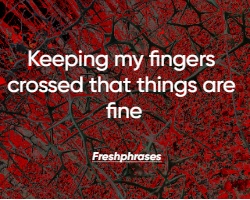
This expression is typically used to convey hope and good luck in an informal and somewhat superstitious manner.
It’s great for situations where someone is awaiting results or is in the middle of a significant endeavor.
Usage examples:
- You’ve been studying so hard for your exams, keeping my fingers crossed that things are fine.
- With all the hard work you’ve put into your project, keeping my fingers crossed that things are fine.
19. Wishing you a smooth and pleasant day (Friendly).
“Wishing you a smooth and pleasant day” is a friendly and kind gesture, perfect for starting someone’s day off right.
It expresses a light-hearted and caring sentiment, suitable for both personal notes and casual professional interactions.
Usage examples:
- With your big meeting today, wishing you a smooth and pleasant day!
- As you head off to your new job, wishing you a smooth and pleasant day—enjoy every moment!
20. Hope life is treating you kindly.
To convey a sense of warmth and kindness, “Hope life is treating you kindly” is perfect. I hope everything is going well and that life is being good to you. This phrase is heartfelt and compassionate.
Usage examples:
- Hope life is treating you kindly and with joy.
- Hope life is treating you kindly and bringing you happiness.

